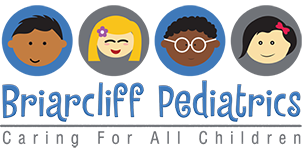What is the difference between Asthma or RSV?
- On May, 02, 2024
- Doctor Notes
- Well Child
 If you have an asthmatic child, chances are you pay close attention to when Respiratory Syncytial Virus (RSV) season begins and ends. You know all too well the importance of remaining vigilant during this time of the year, and you and your child certainly work hard to prevent asthma flare-ups. As we say goodbye to April and begin to embrace the rapidly approaching summer season, you may be tempted to let your guard down. However, it is essential to remember that no two RSV seasons are alike. As we continue our series on RSV, we wanted to focus this month’s blog on answering some important questions concerning RSV and its interactions with asthma.
If you have an asthmatic child, chances are you pay close attention to when Respiratory Syncytial Virus (RSV) season begins and ends. You know all too well the importance of remaining vigilant during this time of the year, and you and your child certainly work hard to prevent asthma flare-ups. As we say goodbye to April and begin to embrace the rapidly approaching summer season, you may be tempted to let your guard down. However, it is essential to remember that no two RSV seasons are alike. As we continue our series on RSV, we wanted to focus this month’s blog on answering some important questions concerning RSV and its interactions with asthma.
What are the symptoms of RSV in asthmatic children?
In our previous blog about RSV, we covered the general symptoms of RSV in both young children and infants. Normally, RSV presents with symptoms similar to a common cold – runny nose, coughing, and sneezing. These symptoms are also similar to those in asthmatic children. The difference is that symptoms of RSV in asthmatic children have the potential to be intensified because the virus is placing additional stress on the airways and lungs, leading to added inflammation. These symptoms may seem benign initially, but in asthmatic children, they can escalate quickly, leading to labored and shallow breathing. This escalation can trigger an asthma attack, which could potentially lead to hospitalization. So, knowing what to look for before this occurs is critical.
How do I know if my child has asthma or RSV?
The best way to determine whether your child is experiencing an asthma attack or RSV is to contact your pediatrician and schedule a sick visit right away. Normally, testing isn’t necessary to determine if your child has contracted RSV, but if your pediatrician decides to run lab tests, the most common test performed is a nasal swab. However, if your child experiences a severe case of RSV, your pediatrician may also order imaging such as a chest X-ray.
Will RSV cause asthma in my child?
While RSV is not a direct cause of asthma, studies conducted by NIH funded researchers reported that 21% of children who contracted RSV by the age 5 had developed asthma. During a child’s first year of life, the lungs and immune system are still under development. When an infant contacts RSV, hypersensitivity to common allergens can occur, leading to a child possibly developing asthma.
What is the best way to protect my asthmatic child against RSV?
There are some basic steps you can take to protect against RSV such as practicing good hygiene and disinfecting common surfaces. However, the best way to protect against RSV is through immunization. Vaccines are available for both adults and children and the CDC recommends the following vaccination schedule:
- Pregnant women can receive 1 dose of Pfizer Abrysvo if they are 32-36 weeks pregnant between September – January.
- Infants who are 8 months of age and younger can receive 1 dose of the monoclonal antibody nirsevimab if they are entering their first RSV season.
- Children between the ages of 8 and 19 months can receive 1 dose of the monoclonal antibody nirsevimab prior to entering their second RSV season if they are considered high risk for severe infection.
- Children up to 24 months old can receive the monoclonal antibody palivizumab if they are considered high risk for severe infection due to other underlying medical conditions.
Another important measure that you and your asthmatic child should take is developing an asthma action plan. Asthma action plans are vital in controlling asthma flare-ups and assist schools and caregivers in caring for your asthmatic child. A strong asthma action plan should include which medications your child should receive in the event of a flare-up, how to recognize when the symptoms are worsening, and who to contact during a medical emergency. If you do not have an asthma action plan, contact your child’s pediatrician at our office, and they will help you develop a strategy.
Personalized treatment and attentive care:
It can be stressful, and at times it may even be scary for parents dealing with asthmatic children who contract RSV, but you don’t need to be afraid. At Briarcliff Pediatrics, we understand how asthma and RSV interact and ensure that each child receives the individualized care they require. If you are concerned that your asthmatic child has contracted RSV, contact our office to schedule a sick visit with Dr. Raymond Deeb or Dr. Rebecca McCoy, who can usually see you the same day. We are also available to answer any lingering questions concerning RSV and will happily schedule a well visit if you would like to vaccinate your child against RSV. Don’t forget to follow us on Facebook and Instagram for the latest news and health tips and be sure to check back next month for more important health care news regarding your children.




